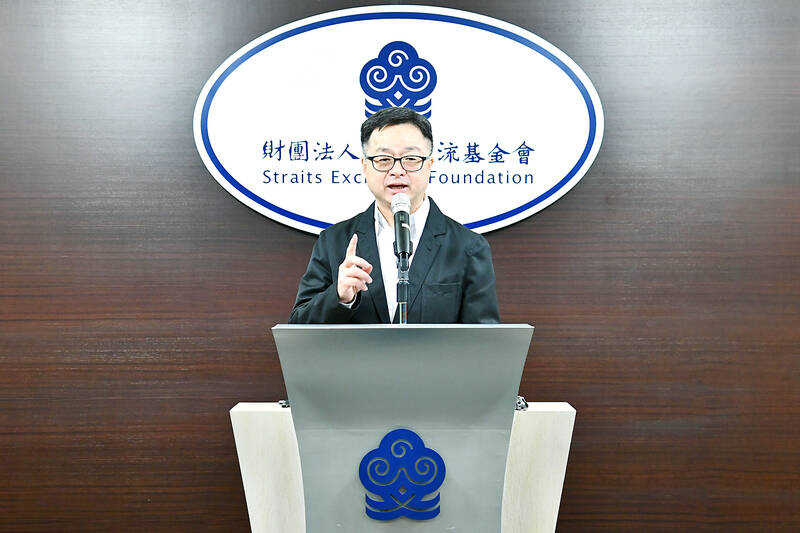There are 77 incidents of Taiwanese travelers going missing in China between January last year and last month, the Straits Exchange Foundation (SEF) said.
More than 40 remain unreachable, SEF Secretary-General Luo Wen-jia (羅文嘉) said on Friday.
Most of the reachable people in the more than 30 other incidents were allegedly involved in fraud, while some had disappeared for personal reasons, Luo said.

Photo courtesy of the Straits Exchange Foundation
One of these people is Kuo Yu-hsuan (郭宇軒), a 22-year-old Taiwanese man from Kaohsiung who went missing while visiting China in August. China’s Taiwan Affairs Office last month said in a news statement that he was under investigation for his alleged involvement in a fraud case.
On the risks for young people traveling to China job opportunities, Lu said: “Youth unemployment [in China] has risen so high that no more high-paying jobs would be left for Taiwanese — people should have common sense,” Luo said.
Taiwanese should be wary if someone such as a friend, acquaintance or stranger touts job opportunities in China that are “highly profitable,” Luo said, adding that those who are tricked into visiting China would likely be forced to do something illegal.
Once they are arrested and prosecuted for crimes such as fraud, they could be put in jail without receiving a fair trial, as China is not a country with the rule of law, he said.
Separately, Democratic Progressive Party Legislator Lin I-chin (林宜瑾) on Friday questioned the Mainland Affairs Council (MAC) on its countermeasures against China’s new policy to “attract first-time visitors from Taiwan.”
Although the MAC issued an “orange” travel warning against China on June 27, the Chinese government has launched a campaign offering first-time holders of “Taiwan Compatriot Permit” free access to more than 1,000 tourist spots in China, she said, asking how the MAC would address the situation.
MAC Minister Chiu Chui-cheng (邱垂正) said Taiwanese should be aware of the risks to their safety when traveling to China, and avoid visiting China, Hong Kong and Macau if it is not necessary.
The travel alert for China, Hong Kong and Macau was upgraded to “orange” in response to Beijing’s announcement of 22 guidelines in June to punish “Taiwanese independence separatists,” which pose a real risk to the personal freedom and safety of Taiwanese, he said.
The 22 guidelines feature vague legal definitions and “uncivilized” rules including long-arm jurisdiction, a lifelong retroactive period, trial in absentia, death penalty and confiscation of property, Chiu added.
Additional reporting by CNA

The High Prosecutors’ Office yesterday withdrew an appeal against the acquittal of a former bank manager 22 years after his death, marking Taiwan’s first instance of prosecutors rendering posthumous justice to a wrongfully convicted defendant. Chu Ching-en (諸慶恩) — formerly a manager at the Taipei branch of BNP Paribas — was in 1999 accused by Weng Mao-chung (翁茂鍾), then-president of Chia Her Industrial Co, of forging a request for a fixed deposit of US$10 million by I-Hwa Industrial Co, a subsidiary of Chia Her, which was used as collateral. Chu was ruled not guilty in the first trial, but was found guilty

DEADLOCK: As the commission is unable to forum a quorum to review license renewal applications, the channel operators are not at fault and can air past their license date The National Communications Commission (NCC) yesterday said that the Public Television Service (PTS) and 36 other television and radio broadcasters could continue airing, despite the commission’s inability to meet a quorum to review their license renewal applications. The licenses of PTS and the other channels are set to expire between this month and June. The National Communications Commission Organization Act (國家通訊傳播委員會組織法) stipulates that the commission must meet the mandated quorum of four to hold a valid meeting. The seven-member commission currently has only three commissioners. “We have informed the channel operators of the progress we have made in reviewing their license renewal applications, and

‘DENIAL DEFENSE’: The US would increase its military presence with uncrewed ships, and submarines, while boosting defense in the Indo-Pacific, a Pete Hegseth memo said The US is reorienting its military strategy to focus primarily on deterring a potential Chinese invasion of Taiwan, a memo signed by US Secretary of Defense Pete Hegseth showed. The memo also called on Taiwan to increase its defense spending. The document, known as the “Interim National Defense Strategic Guidance,” was distributed this month and detailed the national defense plans of US President Donald Trump’s administration, an article in the Washington Post said on Saturday. It outlines how the US can prepare for a potential war with China and defend itself from threats in the “near abroad,” including Greenland and the Panama

Taiwan People’s Party (TPP) Chairman Huang Kuo-chang (黃國昌) yesterday appealed to the authorities to release former Taipei mayor Ko Wen-je (柯文哲) from pretrial detention amid conflicting reports about his health. The TPP at a news conference on Thursday said that Ko should be released to a hospital for treatment, adding that he has blood in his urine and had spells of pain and nausea followed by vomiting over the past three months. Hsieh Yen-yau (謝炎堯), a retired professor of internal medicine and Ko’s former teacher, said that Ko’s symptoms aligned with gallstones, kidney inflammation and potentially dangerous heart conditions. Ko, charged with